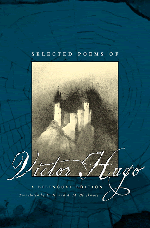
Four poems from
Selected Poems of Victor Hugo
A Bilingual Edition
Translated by E.H. Blackmore and A.M. Blackmore
Published by the University of Chicago Press
|
X. Clair de lune
La lune était sereine et jouait sur les flots.—
De ses doigts en vibrant s'échappe la guitare. Sont-ce des cormorans qui plongent tour à tour, Qui trouble ainsi les flots près du sérail des femmes?—
Ce sont des sacs pesants, d'où partent des sanglots. From Les Orientales (1829) |
X. Moonlight
The moon was calm, and flecked the ocean streams. The lute slips from her fingers as she plays. Are cormorants plunging successively, Who is thus troubling the seraglio's shores?—
Merely full sacks emitting muffled screams; |
|
VII. A Virgile
O Virgile! ô poëte! ô mon maître divin! Pour toi qui dans les bois fais, comme l'eau des cieux, Pour toi je l'ai cherchée, un matin, fier, joyeux, Car elle a dans le cœur cette fleur large et pure, Maître! puisque voici la saison des pervenches, From Les Voix intérieures (1837) |
VII. To Virgil
Virgil! come, O poet, O my sacred master! You that in the forest make mysterious verses Yes, for you I found it, one morning, proud and happy, She too has the mystic love of age-old nature, Master, since it is the time of year for periwinkles, |
|
II.vi. Lettre
Tu vois cela d'ici.—
Des ocres et des craies, From Les Contemplations (1856) |
II.vi. Letter
You can see it already: chalks and ochers; |
|
V.xxiv. "J'ai cueilli cette fleur pour toi sur la colline…"
J'ai cueilli cette fleur pour toi sur la colline. From Les Contemplations (1856) |
V.xxiv. "I picked this flower for you on the hilltop…"
I picked this flower for you on the hilltop. |
Copyright notice: Excerpted from Selected Poems of Victor Hugo translated by E.H. Blackmore and A.M. Blackmore, published by the University of Chicago Press. ©2001 by the University of Chicago. All rights reserved. This text may be used and shared in accordance with the fair-use provisions of U.S. copyright law, and it may be archived and redistributed in electronic form, provided that this entire notice, including copyright information, is carried and provided that the University of Chicago Press is notified and no fee is charged for access. Archiving, redistribution, or republication of this text on other terms, in any medium, requires the consent of both the author and the University of Chicago Press.
Selected Poems of Victor Hugo: A Bilingual Edition
Translated by E.H. Blackmore and A.M. Blackmore
©2001, 664 pages, 11 halftones
Cloth $35.00 ISBN: 0-226-35980-8
Paper $22.50 ISBN: 0-226-35981-6
For information on purchasing the book--from bookstores or here online--please go to the webpage for Selected Poems of Victor Hugo.
See also: